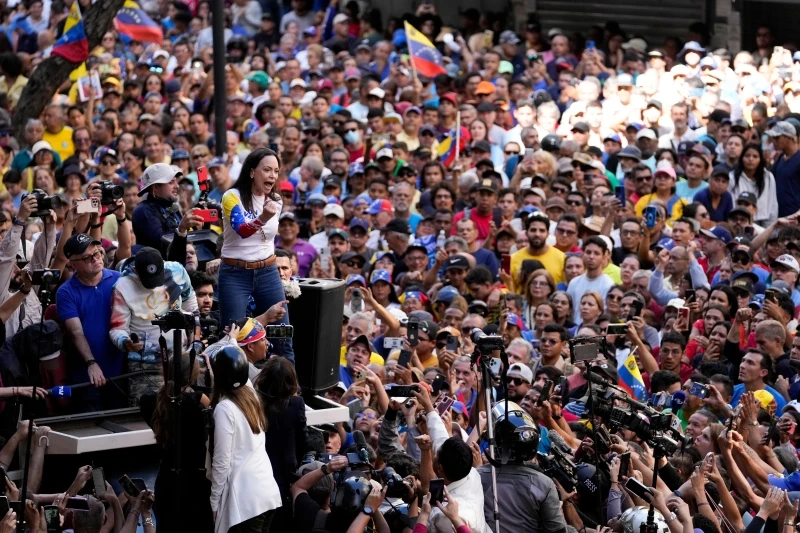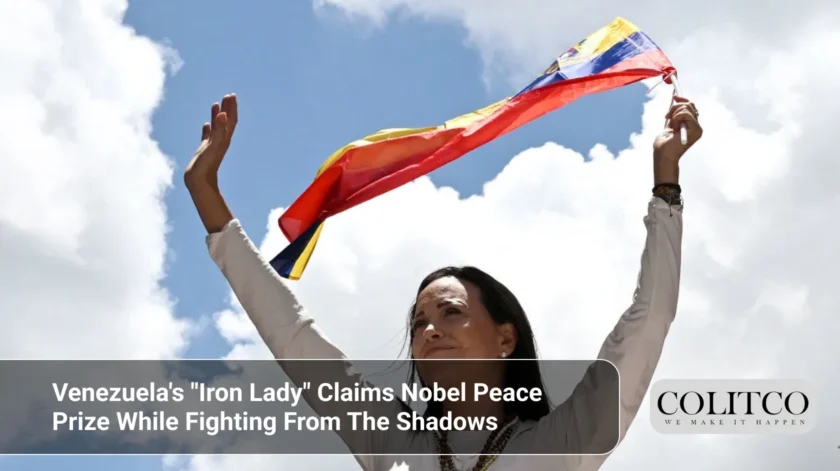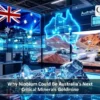A defiant Venezuelan opposition leader who hasn’t seen sunlight in 14 months just won the world’s most prestigious peace award.
María Corina Machado received the 2025 Nobel Peace Prize on Friday while in hiding somewhere in Venezuela. The 58-year-old industrial engineer turned political firebrand has been underground since last year’s contested presidential election.
Her win sparked celebrations across Latin America and praise from conservative leaders worldwide. It also reignited debates about democracy, authoritarianism, and the role of international pressure in regime change.
BREAKING NEWS
The Norwegian Nobel Committee has decided to award the 2025 #NobelPeacePrize to Maria Corina Machado for her tireless work promoting democratic rights for the people of Venezuela and for her struggle to achieve a just and peaceful transition from dictatorship to… pic.twitter.com/Zgth8KNJk9— The Nobel Prize (@NobelPrize) October 10, 2025
The Woman Called Venezuela’s Thatcher
The Norwegian Nobel Committee cited Machado’s “tireless work promoting democratic rights” and her “struggle to achieve a just and peaceful transition from dictatorship to democracy.”
Jørgen Watne Frydnes, committee chair, called her “one of the most extraordinary examples of civilian courage in Latin America in recent times.”
Key achievements recognised:
- Uniting Venezuela’s fragmented opposition movement
- Resisting militarisation of Venezuelan society
- Training hundreds of thousands of election observers
- Remaining in Venezuela despite serious death threats
Machado founded Súmate in 2002, an organisation devoted to free and fair elections. She served in Venezuela’s National Assembly from 2010 to 2014 before being expelled on what international observers called fabricated charges.
A Contested Election That Changed Everything
The 2024 Venezuelan presidential election remains one of the most controversial in recent Latin American history.
Machado won her party’s primary with a commanding lead. The government promptly banned her from running, citing corruption allegations dismissed by the US and EU as politically motivated.
She backed replacement candidate Edmundo González Urrutia instead. The opposition documented vote tallies showing González won decisively. President Nicolás Maduro’s government claimed victory without presenting evidence.
What happened next:
- Thousands took to streets in protest
- Government launched brutal crackdown
- Machado went into hiding in August 2024
- González fled to exile in Spain
- Several of Machado’s team arrested or forced to flee
She made just two public appearances since going underground. Both times, she arrived on a motorcycle, delivered brief speeches, and vanished before authorities could respond.
Trump Connection Draws Headlines
Minutes after learning of her win, Machado posted on social media dedicating the prize to “the suffering people of Venezuela and to President Trump for his decisive support of our cause!”
The dedication stirred immediate controversy. Trump had been considered a potential Nobel recipient after brokering a ceasefire between Israel and Hamas earlier this year.
White House Communications Director Steven Cheung accused the Nobel Committee of placing “politics over peace.”
Trump has recognised González as Venezuela’s legitimate leader and warned Maduro about opposition safety. The US military has conducted strikes in international waters off Venezuela, targeting alleged drug trafficking operations.

Machado addressing supporters during the 2024 campaign
International Reactions Split Along Ideological Lines
European Parliament President Roberta Metsola called it “well-deserved recognition.” Colombia’s former President Álvaro Uribe declared: “Long live María Corina, long live democracy.”
US Secretary of State Marco Rubio, who previously co-signed a letter endorsing Machado for the prize, praised the decision.
Critics pointed to her right-wing economic policies and support for US sanctions. Yale historian Greg Grandin told Democracy Now the choice was “perplexing” and could bring “the opposite of peace.”
Machado advocates privatising Venezuela’s state oil company PDVSA and supports free-market reforms. She backed the 2002 coup attempt against Hugo Chávez, Maduro’s predecessor.
Venezuela’s Humanitarian Crisis Deepens
The Nobel Committee’s announcement highlighted Venezuela’s transformation from “relatively democratic and prosperous” to a “brutal, authoritarian state.”
The crisis by numbers:
- 8 million Venezuelans fled the country
- Most citizens live in deep poverty
- Systematic election rigging and political persecution
- Widespread human rights violations
Machado told NPR she trusts the Venezuelan people and believes Maduro is “totally isolated, weaker than ever.” She insists she’ll remain in Venezuela despite the dangers.
Her husband left the country. Her three children are abroad. Her mother, now in her 80s, fled after years of telling Machado that “those blessed with more opportunities should give back more.”
What Happens Next?
The Nobel Prize includes approximately $1.47 million AUD. More importantly, it brings international attention to Venezuela’s democracy crisis.
Machado said the recognition shows “we are very close to achieving, finally, freedom for our country and peace for the region.”
Whether that optimism proves justified remains uncertain. Maduro shows no signs of stepping down. The US maintains economic pressure. Regional powers like Brazil and Colombia have called for dialogue.
The prize ceremony occurs in December. Whether Machado can safely attend remains an open question.
Also Read: Inside the Nobel Peace Prize: When It’s Awarded and Who Chooses the Winner
FAQs
Q: Where is María Corina Machado now?
A: She’s in hiding somewhere in Venezuela. Her exact location is unknown for security reasons, though she’s confirmed she hasn’t left the country.
Q: What is the Nobel Peace Prize worth?
A: The 2025 prize includes 11 million Swedish Kronor, approximately $1.47 million AUD.
Q: Did Machado actually win the 2024 Venezuelan election?
A: She was banned from running. Her backed candidate Edmundo González presented evidence suggesting he won decisively, but Maduro claimed victory.
Q: Why is she called the “Iron Lady”?
A: The nickname references Britain’s Margaret Thatcher. Machado cites Thatcher as her political role model.
Q: Has anyone escaped Venezuela’s government before?
A: Many opposition figures have fled to exile. Machado’s decision to remain in hiding within Venezuela is unusual and considered exceptionally dangerous.












